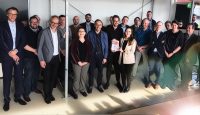 .
. 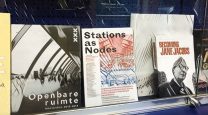
Official book launch Stations as Nodes
See also: Metropolitan Stations and Integrated Mobility Challenges

 .
. 
Official book launch Stations as Nodes
See also: Metropolitan Stations and Integrated Mobility Challenges
The theme of this playground meeting has been ‘value dynamics’. We have touched upon questions like: How to deal with value dynamics when designing for values? How can we successfully operationalize values to inform design decisions, whilst anticipating possible value changes? How can we make our designs able to adapt to value changes in society? How does the theory apply to specific application areas, such as architecture and urbanism?
Two pitch presentations have kickstarted interdisciplinary discussions:
Design for Changing Values (ERC granted research project)
by Ibo van de Poel
Historical and Spatial Approaches to Value Dynamics
by Carola Hein and Maurice Harteveld
when:
21 March 2019, 12:00 to 13:30h
where:
Delft University of Technology
Faculty of Technology, Policy and Management
Classroom H (31-A1-210)
Places for Change and Innovation
A train station has always been a space for many and it is about time to be approached and designed as such. The urgency is there. Stations have become an intermodal hub with a large crowd being present. From a human perspective, it makes sense: Stations are part of the larger network of public spaces, indoors – outdoors, and interlink other hybrid places and buildings. The more people flock to the city, the more move and stay at stations and/or elsewhere close-by. The role of stations in the network strengthens. More and different people are present. As such, from the observation that the whole is more than the sum of fixed demarcated elements, ever-changing human hubs are perfect settings for place-based innovation in design and by design, because where people move, society changes, and where strangers meet change takes place.
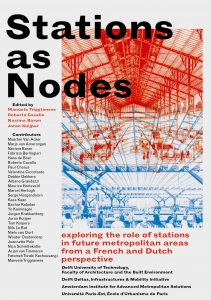
Read the article: Metropolitan Stations, Places for Change and Innovation (2018) by Maurice Harteveld (c)
See also: Station as Nodes and Integrated Mobility Challenges
Exploring Sustainable Urban Integration Approaches
in Future Metropolitan Areas
The Amsterdam Institute for Advanced Metropolitan Solutions (AMS), the Delft Deltas, Infrastructures & Mobility Initiative (DIMI), the University of Paris-Est and ARENA Architectural Research Network join Delft University of Technology in the organisation of the interdisciplinary 2018 Summer School: Integrated Mobility Challenges in Future Metropolitan Areas. This is a follow up of Making the Metropolis edition held in Amsterdam in August 2017 and the Stations of the Future event held in Paris in March 2018.
Integrated Mobility Challenges will explore interdisciplinary approaches towards a sustainable urban integration of rail-metro stations. At the main point of intersection between the railway and the city, stations are key elements of the organization of the intermodal transport but also catalysts of urban developments. The main question will be: which approaches and scenarios can be tested and applied to these intermodal nodes, particularly when dealing with lack of space and growing number of users? By using Amsterdam (case of Sloterdijk station area) as test-bed and design location you will exchange knowledge and apply different strategies of sustainable solutions.
When
From 21st to 28th August 2018
Where
Delft University of Technology (NL) with fieldwork in Amsterdam (NL)
Target Group
60 researchers or young professionals and master students in Architecture, Urban Design and Planning, Environmental Design and Sciences, Landscape Architecture, Transport, Infrastructure and Logistics, and related disciplines.
More information can be found here: Summer School Integrated Mobility Challenges
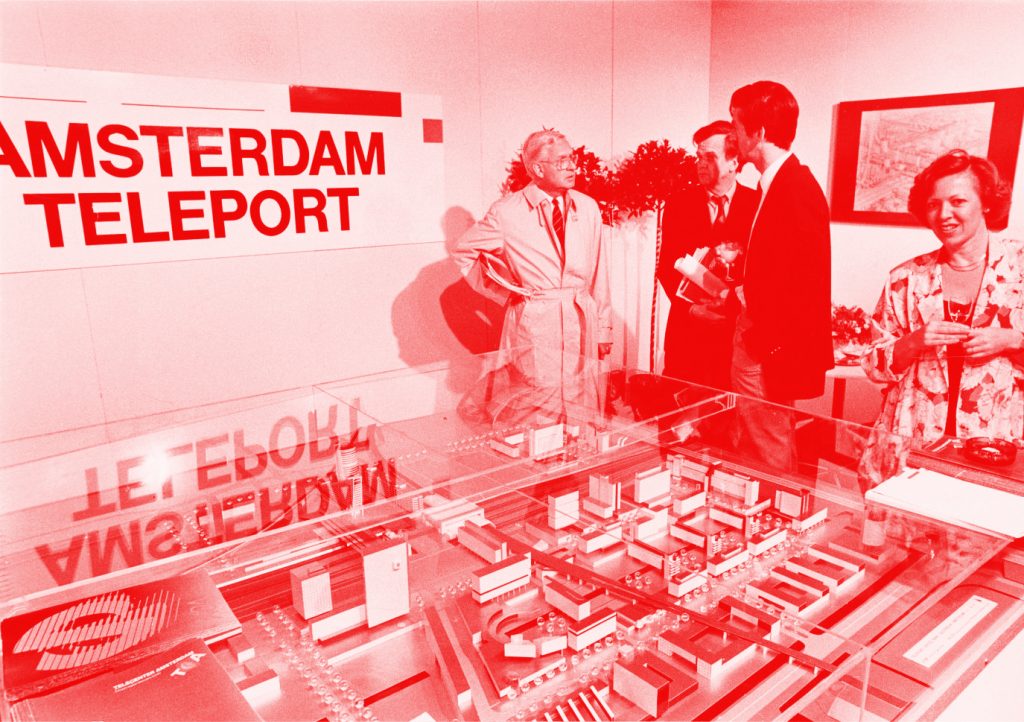
UPDATE: See also Metropolitan Stations and Stations as Nodes
Making Cities in Times of Major Transitions
On January 10, 2018, our research ‘The City of the Future’ has starts. This study explores new ways of city making by using five test locations of 1 x 1 km in the cities of Amsterdam, Rotterdam, The Hague, Utrecht and Eindhoven (five most populated cities in The Netherlands). We question how we can interrelate urban development, whilst urban design, planning and engineering, to upcoming challenges like shifts in transport, energy transition, circular economy and other system and network innovations, in times of the next generation of densification.
Continue reading
Today an exiting new institute has opened: The Delft Design for Values (DD4V) institute! The DD4V institute brings together practices and expertise in the field of design for values. It integrates my modest work with those of many others, and expand the existing. As such in the new institute we provide mechanism for the incorporation of moral and social values in technologies through their design processes. Research activities of DD4V will be organised along four themes: Value operationalisation, value assessment, value dynamics, and value conflict.
Continue reading
As the majority of the world population is living in cities today, urban environments have become a place for many people. We are obliged to aim at sustainability and safeguard people’s quality of life, and human wellbeing. These challenges are motivating science and society to approach metropolises differently. Advanced metropolitan solutions to overcome problems are being made possible by today’s revolution of new technologies, theories and methods. But no actor or stakeholder can make metropoles move in one certain direction. Metropolitan solutions require cooperation between knowledge institutes, companies, governments, between cities, citizens and civil society.
The new MSc programme Metropolitan Analysis, Design and Engineering (MADE) integrates analysis, design and engineering in the sphere of the flows in the city; the physical, digital and social environments; and the city and its citizens. As full master programme, the MSc MADE prepares students to be specialised on one hand and an integrator on the other. A MADE graduate will be able to create synergy between specialists from other disciplinary backgrounds. You can make a cross-over too!
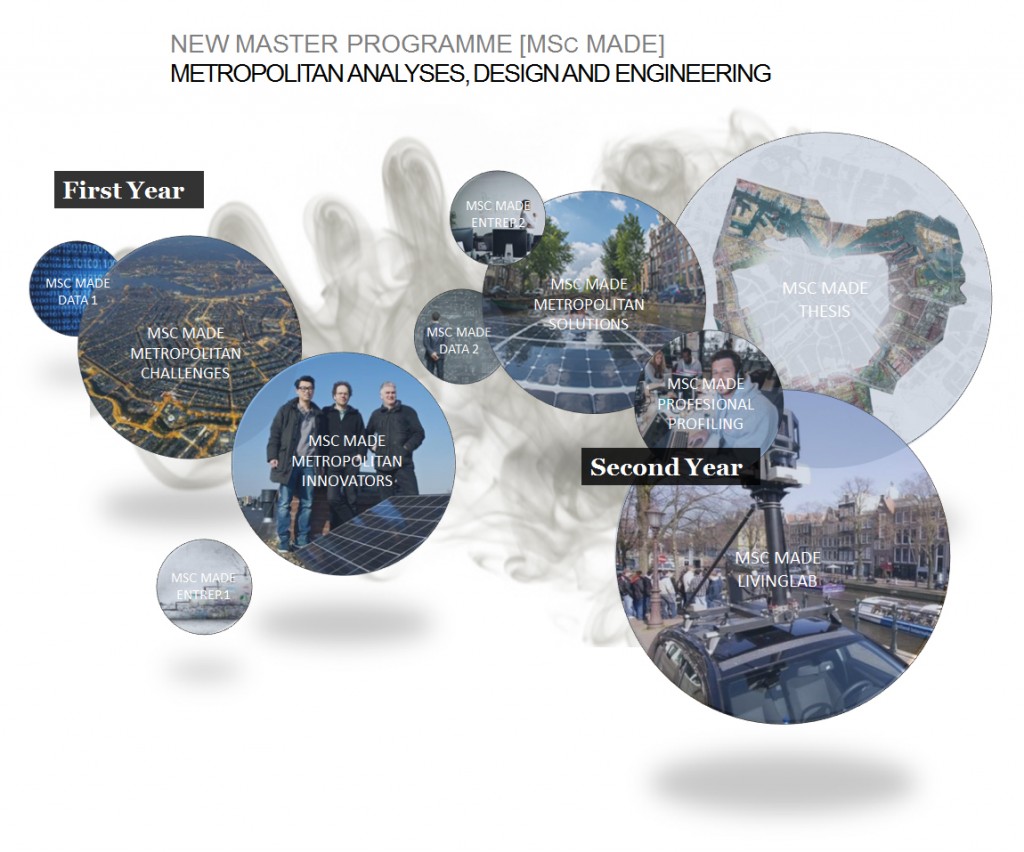
The new trans- and interdisciplinary programme will be offered as a joint degree programme by Delft University of Technology and Wageningen University. It is built on their joint research activities, and consolidated in their participation together with the Massachusetts Institute of Technology (MIT) in the Amsterdam Institute for Advanced Metropolitan Solutions (AMS).
Continue reading
Delft University of Technology
Julianalaan 132-134
Delft
Our conference ‘For Example Delft’ addressing approaches in architecture education: What to teach in the context of Radical Realities? What to learn from the Humanisation of Design? How to prepare for Multi-Actor Approaches? How to be qualified in an age of Animated & Automated Creation? – with resp. Merete Ahnfeldt-Mollerup (Royal Danish Academy) Peter Staub (University of Liechtenstein) Maria Rubert de Ventós (ETSAB) and Thomas Bock (TU München). In the evening: Laura Lee (Carnegie Mellon University) and Diane Ghirardo (University of Southern California).
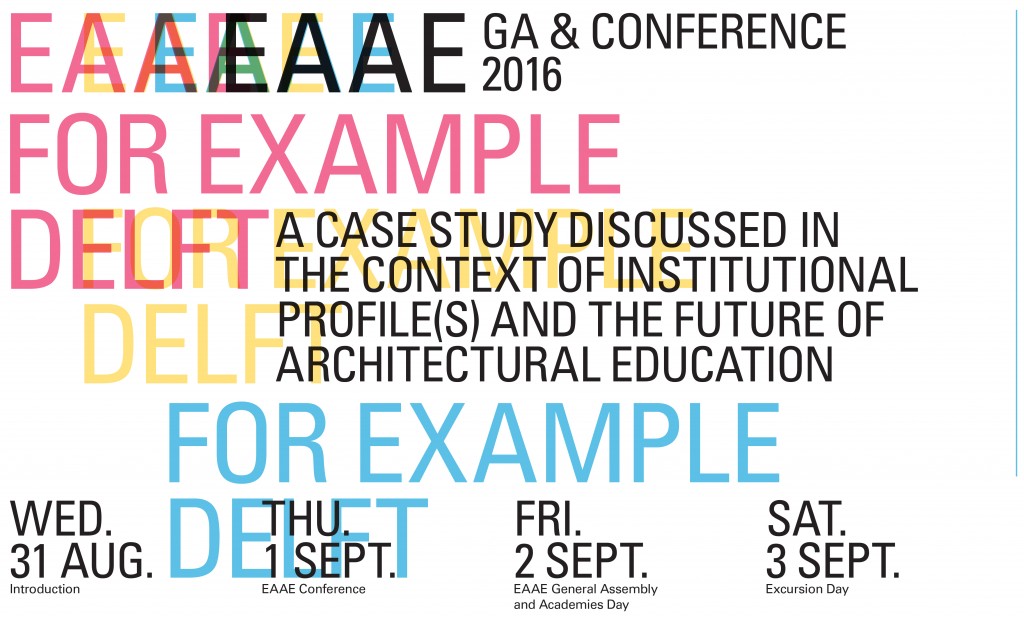
See:
EAAE Annual Conference & Assembly September 2016 (available in 2016)
European Association for Architectural Education / Association Européenne pour l’Enseignement de l’Architecture
![]()
What may happen if we track people? Since Human released their first app version in September last year, they’ve collected over 55 million activities. This set of valuable activity data is growing crazy fast. Human Cities is their first attempt to translate data into useful insights. Interesting example bringing tech into life science!
Continue reading
In a fast urbanising world, cities and metropolitan regions increasingly face challenges of sustainability and quality of life challenges that put at risk issues of mobility and logistics, water and waste management, energy and food security, health and wellbeing. A new two-year master programme Metropolitan Analysis, Design and Engineering (MSc MADE) integrates analysis, design and engineering; the physical, digital and social environments; and the city and its citizens. These challenges are motivating science and society to approach metropoles differently. Advanced metropolitan solutions are being made possible by today’s revolution of new technologies, theories and methods. But no actor or stakeholder can make metropoles move in one certain direction. Metropolitan solutions require cooperation between knowledge institutes, companies, governments, between cities, citizens and civil society.